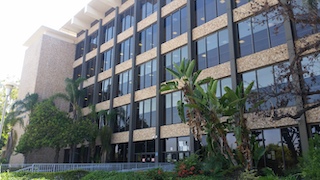The prosecution must present evidence to establish beyond a reasonable doubt that the defendant committed the charged crime in whole or in part because of the alleged victim’s actual or perceived disability, gender, nationality, race or ethnicity, religion, sexual orientation, or association with a person or group having one or more of these actual or perceived characteristics.
 Torrance Courthouse
Torrance Courthouse
The terms of this crime are further defined at Penal Code §§ 422.56 (a) – (i). “Association with a person or group with these actual or perceived characteristics” includes advocacy for, identification with, or being on the ground owned by or rented by, or adjacent to, any of the following: a community center, educational facility, family, individual, office, meeting hall, place of worship, private institution, public agency, library or other entity, group, or person that has, or is identified with people who have, one or more of those characteristics listed in the definition of “hate crime” in § 422.55.
“Disability” includes mental disability or physical disability as defined in Government Code § 12926(j) and (m). CALCRIM 1353 also defined disability in the jury instructions.
“Gender” in the context of the hate crime statute means sex and includes a person’s gender identity and gender-related appearance and behavior whether or not stereotypically associated with the person’s assigned sex at birth.
“In whole or in part because of” means that the bias motivation must be a cause in fact of the offense, whether or not other causes also exist. Hate does not need to be the only cause of the crime. When multiple concurrent motives exist, the prohibited bias must be a substantial factor in bringing about the particular result. There is no requirement that the bias be the main factor or that it be a factor without which the crime would not have been committed. See In re M.S. (1995) 10 Cal.4th 698, 719; People v. Superior Court (Aishman) (1995) 10 Cal.4th 735, 741.
“Nationality” includes citizenship, county or origin, and national origin.
“Race or ethnicity” includes ancestry, color and ethnic background.
“Religion” includes all aspects of religious belief, observance, and practice and includes agnosticism and atheism, too.
“Sexual orientation” includes heterosexuality, homosexuality or bisexuality. Penal Code § 422.56(h).
“Victim” includes, but is not limited to a community center, educational facility, entity, family, group, individual, office, meeting hall, person, place of worship, private institution, public agency, library or other victim or intended victim of the offense.
Unlike the substantive hate crimes set forth in Penal Code §§ 422.6 and 422.7, the hate crime enhancements of § 422.75 do not require specific intent. People v. Superior Court (Aishman) (1995) 10 Cal.4th 735, 739.
The substantive hate crimes included at Penal Code § 422.6 includes using force or threat of force to willfully injure, intimidate, interfere with, oppress, threaten another in the free exercise or enjoyment of the civil rights of another guaranteed under the federal or state constitution. This most commonly has to do with freedom of speech and religion. A violation of § 422.6 is a misdemeanor.
Penal Code § 422.7 prohibit causing physical injury to another or causing more than $950 in damage to the property of another.
Surprisingly, both 422.6 and 422.7 are considered a misdemeanor, which seems to be a wise option to keep in mind if plea bargaining a violation of Penal Code § 422.75, which is a felony.
For more information about hate crime issues, please click on the following articles:
 Torrance Courthouse
Torrance Courthouse